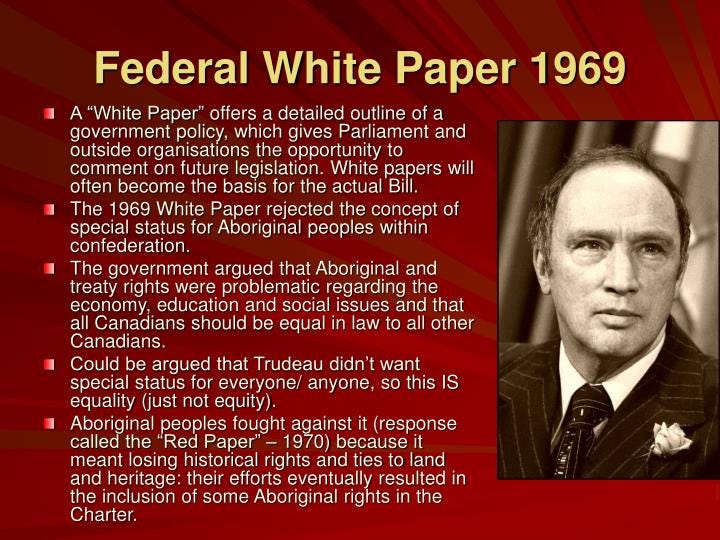As applied to Canada’s Treaty Indians, the call below by James C. McCrae, a former attorney general of Manitoba and previous Canadian citizenship judge, that “Yes, it is Indeed Time to Move on” has become the most controversial public policy call in our increasingly fractured country.
This statement was rarely disputed in the five centuries of contact between the growing number of European settlers and Canada’s aboriginal peoples — the country’s first human settlers — whose leaders generally understood the need to not only accommodate but adapt to Western civilization. Indeed, those indigenous people who were able to do so, usually because of where they lived and how much contact they had with the European agents of change, eagerly embraced modern tools and technology, literacy, formal education, market exchange, Christian religious beliefs and practices, and the supremacy of the state and its laws.
But all that changed in 1969 when “time to move on” was politically rejected by indigenous leaders and activists after Pierre Trudeau’s Liberal government introduced its White Paper outlining government initiatives, formally termed the “Statement of the Government of Canada on Indian Policy, 1969”.
This White Paper was presented to the First Session of the Twenty-eighth Parliament by Jean Chrétien, then Minister of Indian Affairs and Northern Development. Its opening paragraphs said:
To be an Indian is to be a man, with all a man's needs and abilities. To be an Indian is also to be different. It is to speak different languages, draw different pictures, tell different tales and to rely on a set of values developed in a different world.
Canada is richer for its Indian component, although there have been times
when diversity seemed of little value to many Canadians.But to be a Canadian Indian today is to be someone different in another way. It is to be someone apart - apart in law, apart in the provision of government services and, too often, apart in social contacts.
To be an Indian is to lack power - the power to act as owner of your lands, the power to spend your own money and, too often, the power to change your own condition.
Not always, but too often, to be an Indian is to be without - without a job, a good house, or running water; without knowledge, training or technical skill and, above all, without those feelings of dignity and self-confidence that a man must have if he is to walk with his head held high.
All these conditions of the Indians are the product of history and have nothing to do with their abilities and capacities. Indian relations with other Canadians began with special treatment by government and society, and special treatment has been the rule since Europeans first settled in Canada. Special treatment has made of the Indians a community disadvantaged and apart.
Obviously, the course of history must be changed.
More obvious still, the White Paper never even became a parliamentary bill. And the adverse effects of its rejection continue to live on today.
Most obvious of all, those today calling for indigenous people to move on are vilified as racist genocide deniers, as retired Manitoba Provincial Court judge Brian Giesbrecht quickly discovered when he was cancelled by the Winnipeg Sun newspaper and otherwise lambasted by critics like Jessica Ernst for daring to challenge “woke” beliefs about indigeneity:
“Utter disgust” at retired judge Brian Giesbrecht’s “filth” telling us “to move on” from 215 Indigenous children found [sic] in unmarked graves at Kamloops Residential School. “He is the disease.” A despicable Canadian Caveman. “I worry about how he may have injected his incredibly biased views against Indigenous people during his time as a judge in Manitoba. I am thoroughly disgusted.” Posted on June 15, 2021 by Jessica Ernst
Still, those calling for the total equality of treatment of indigenous people with all other Canadians will never be silenced, if only because they have justice and truth as opposed to special rights, exaggerated grievances, and recently invented myths on their side.
Jim McRae’s nuanced and intelligent take on this issue, only available to paid subscribers and reproduced below with his kind permission, should be required reading for all Canadians.
Keep reading with a 7-day free trial
Subscribe to REAL Indigenous Report to keep reading this post and get 7 days of free access to the full post archives.





